
Brazil, set to assume the rotating presidency of Mercosur in July, plans to advocate for the inclusion of the automotive and sugar industries within the bloc's trade regulations, the Brazilian Ministry of Foreign Affairs announced on June 27 (local time).
Within Mercosur, the automotive and sugar sectors have, for specific reasons, been excluded from general trade rules. Francisco Cannabrava, Director of Mercosur Affairs at the Brazilian Foreign Ministry, explained that these two sectors "have been excluded for specific reasons, and there is sensitivity surrounding them." He added that while trade rules for the automotive sector within Mercosur are determined through bilateral agreements between member states, "such agreements don't even exist" for sugar.
Brazil's current proposal is interpreted as an attempt to bring these two major industries, long treated as exceptions, into the bloc's unified trade system. Gisela Padovan, Undersecretary for Latin America and the Caribbean at the Foreign Ministry, stated that although concrete negotiations have not yet begun, Brazil will officially put forward this proposal during its rotating presidency in the second half of the year.
Industry Background and Current Status
Automotive Industry: The automotive industry within Mercosur has primarily developed around Argentina and Brazil. These countries have maintained tariff and non-tariff barriers to intra-regional trade to protect and foster their domestic industries. Particularly, tariff rates on parts imports and local production obligations have been flexibly applied through bilateral agreements. While this approach has contributed to the development of each country's automotive industry, many have pointed out that it has hindered full integration and competition within the regional market.
Brazil's current proposal aims to accelerate the integration of the regional automotive market, enhance production efficiency, and ultimately strengthen the overall industrial competitiveness of Mercosur. The inclusion of the automotive industry in the rules is expected to lead to a single set of intra-regional regulations for parts procurement and vehicle imports/exports, thereby improving the efficiency of production and distribution.
Sugar Industry: Sugar is one of Brazil's main export items, and it is the world's largest producer and exporter of sugar. However, there is no free trade of sugar within Mercosur. This is primarily because some member states, such as Argentina, have a strong tendency to protect their domestic sugar industries. Sugar has been classified as a sensitive item due to its high price volatility in the international market and its close ties to each country's agricultural policies.
By including the sugar industry in Mercosur's trade rules, Brazil intends to revitalize intra-regional sugar trade and further expand its sugar exports. This could advance the integration of the regional agricultural sector and positively impact food security.
Future Outlook and Challenges
The Mercosur Summit will be held on June 26 and 27 in Buenos Aires, Argentina, with member states Argentina, Brazil, Uruguay, and Paraguay, along with Bolivia, which is in the process of accession, in attendance. At the closing ceremony, Brazilian President Luiz Inácio Lula da Silva will receive the Mercosur rotating presidency from Argentine President Javier Milei. Despite ideological differences, President Lula and President Milei have maintained bilateral relations and cooperation within Mercosur.
The key to Brazil's proposal will be securing consensus among Mercosur member states. Opposition from member states prioritizing the protection of their domestic industries is anticipated. Nevertheless, this proposal is considered an important step for Mercosur to deepen regional market integration and strengthen the bloc's overall economic capacity. The inclusion of the automotive and sugar industries in the rules will lower intra-regional trade barriers and increase economic interdependence among member states, contributing to the bloc's cohesion.
Furthermore, Brazil's move could positively influence negotiations for a Free Trade Agreement (FTA) between Mercosur and the European Union (EU). The EU has demanded market opening from Mercosur in agricultural sectors, especially for sensitive items like sugar. If Mercosur itself regularizes intra-regional sugar trade rules, it could provide a favorable position in external negotiations.
The discussions on including these two industrial sectors, led by Brazil, will be an important indicator for Mercosur's future development and the pace of regional economic integration. Coordinating the interests of member states and reaching mutually beneficial agreements will be Brazil's key task as the rotating president.
[Copyright (c) Global Economic Times. All Rights Reserved.]




























